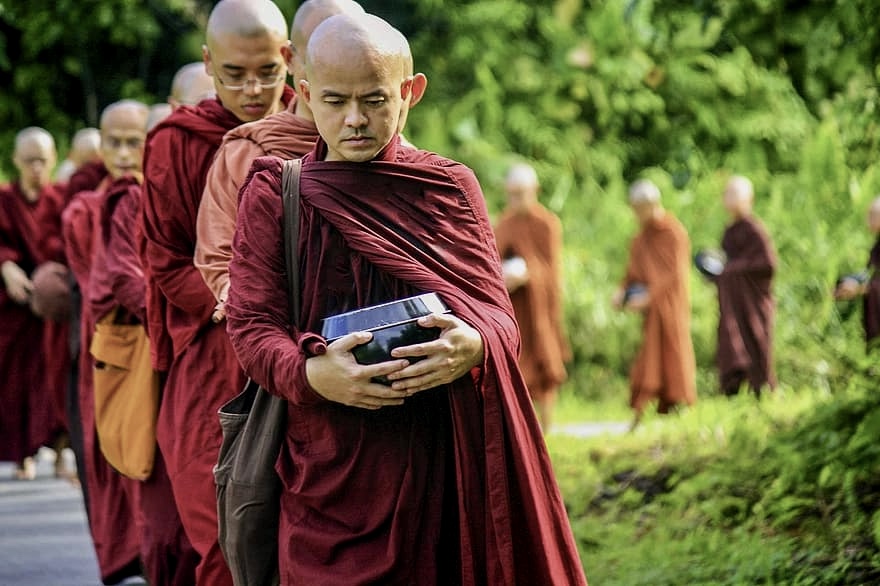
No weapon that is formed
against thee shall prosper; and
every tongue that shall rise against thee
in judgment thou shalt condemn. This is the
heritage of the servants of the Lord,
and their righteousness is of
me, saith the Lord.

No weapon that is formed
against thee shall prosper; and
every tongue that shall rise against thee
in judgment thou shalt condemn. This is the
heritage of the servants of the Lord,
and their righteousness is of
me, saith the Lord.

the most authentic master I ever encountered
Something in prolonged contact with rouge eventually becomes red, something in prolonged contact with soot eventually becomes black. What I realize as I observe this is the tao of habituation to good and bad.
When you live with good people, what you always hear are good words and what you always see are good actions. Hearing and seeing good words and actions over a long period of time plants good seeds in your mind, so that you spontanteously become accustomed to goodness.
When you live with bad people, what you always hear are bad words and what you always see are bad actions. Hearing and seeing bad words and bad actions over a long period of time plants bad seeds in your mind, so that you naturally become accustomed to badness.
Good and bad people are said to be so by nature, but most become so through habit. Therefore wise people choose their associates carefully.

Entering through practice
refers to the Four Practices — all other
practices are contained within these. What are
the Four Practices? First, the practice of repaying wrongs.
Second, the practice of going along with the causal
nexus. Third, the practice of not seeking
anything. Fourth, the practice of
according with the
Dharma.
What is the practice
of repaying wrongs? When receiving
suffering, a practitioner who cultivates the Path
should think to himself: “During countless ages past
I have abandoned the root and pursued the branches, flowing
into the various states of being, and giving rise to much rancor and
hatred — the transgression, the harm done, has been limitless.
Though I do not transgress now, this suffering is a disaster
left over from former lives — the results of evil deeds
have ripened. This suffering is not something
given by gods or humans.”
You should willingly
endure the suffering without anger
or complaint. The sutra says: “Encountering
suffering, one is not concerned. Why? Because one
is conscious of the basic root.” When this attitude toward
suffering is born, you are in accord with inner truth,
and even as you experience wrongs, you advance
on the Path. Thus it is called “the practice
of repaying wrongs.”
Records of the Teachers and Students of the Lanka

by fbi and fdle your names are known
Once any sentient beings
see the Buddha, it will cause them
to clear away habitual obstructions and
forever abandon devilish actions:
this is the path traveled by
Illumination.

Having left the Fifth Ancestral Teacher’s place, Hui Neng traveled south for two months, and had reached the Ta Yu Range. He was pursued by the monk Hui Ming, who was originally a general, accompanied by several hundred men, who wanted to seize the robe and bowl (emblematic of succession to the ancestral teachers).
Ming was the first to overtake him. The Sixth Ancestral Teacher threw down the robe and bowl on a rock and said, “This robe signifies faith: how can it be taken by force?” Ming tried to pick up the robe and bowl, but was unable to move them. At that point he said, “I have come for the Dharma, not for the robe.”
The Ancestral Teacher said, “Since you’ve come for the Dharma, you should put to rest all your motivations, and don’t give rise to a single thought, and I will explain for you.” After a silence, he said, “Without thinking of good, and without thinking of evil, at just such a time, which is your original face?”
At these words, Hui Ming was greatly enlightened. He also asked, “Besides the intimate words and meaning that struck home a moment ago, is there any further intimate message?”
The ancestral teacher said, “If it were said to you, it wouldn’t be intimate. If you turn around and reflect, what’s intimate is in you.”